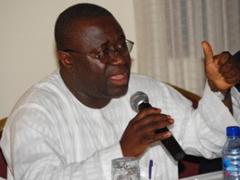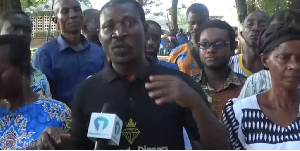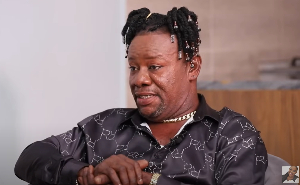Dr. Kwasi Aning of the Kofi Annan International Peacekeeping Training (KAIPTC) sys Ghanaians should not be deluded into thinking the 2012 general elections would go ahead smoothly per the aggressive posture taken by politicians and their parties.
“Politicians in Ghana are still in the business of deliberately preaching hatred, busily exploiting ethnicity, regionalism and religious groups just to win power and we sit here and think that Ghana's democratic credentials are intact. The falsehood and wrong perception of Ghana as a front-runner state is not doing us any good.”
Dr. Aning was speaking in Accra Tuesday at the 5th National Human Rights lectures organized by the Commission on Human Rights and Administrative Justice (CHRAJ) in collaboration with Commonwealth Human Rights Initiative (CHRI) under the theme: “Ensuring good governance; protecting the citizen's rights to vote”.
After the chairperson had explained the rationale for the lecture, Dr. Aning who was billed to lecture on “Eliminating election-related violence and civil strife in West Africa,” said he was changing his topic to “Managing the process because “Eliminating election-related violence would not happen in the 2012 contest.
He said “If we allow politicians to plunge this country into chaos it would take Ghana many years to recover and added that 'only one week of violence would mean 30 years of Foreign Direct Investment that would not come in.”
He said reports showed that on the whole of the continent, it was the west African sub-region that had been found to be very unstable as the region had experienced more democratic obstacles than democratic growth in recent times.
He said in the sub-region, every single civil war had started from elections, adding “In 2008, we just managed to scrap through and we are not learning our lessons. We have to ask ourselves tough counter questions whether we are doing what is right for this country to survive democratically.”
He said since the time table for election 2012 was made clearer, political actors had stepped up their game of inciting people against others just for votes.
The security expert said “When they meet the development partners they speak a different language. When they are in public or on radio they sing a different tune and when they meet their supporters in secret they say all sorts of dangerous things including inciting them to attack their opponents.”
“They do not care about the future of this country and are prepared to kill to get power. If you use language that threatens the peace of the country then you are not fit to govern.”
He said the time had come for the political parties to be compelled to disclose their sources of funding since some used narcotics drug money to fund their campaigns.
Dr. Aning also charged the Electoral Commission to ensure that its integrity cannot be “touched” and the security agencies to remain neutral since any hitch would spell doom for the country.
He also urged EOCOWAS to force Ghana to abide by the protocols it signed towards democracy and good governance.
Dr. Ken Ahorsu, a lecturer at the Legon Centre for International Affairs and Diplomacy (LECIAD) who touched on the topic: “Challenges of conflict management during elections in Ghana” said politics would continue to dominate the lives of the people so long as the country's economics situation remained low.
He said once the authorities particularly the police and the judiciary were not punishing election-related crimes people had become emboldened to do all sorts of things.
Joseph Whittal, a Deputy Commissioner in charge of Legal and Administration at CHRAJ who chaired the function said the commission's investigations on the election environment had shown that tension was mounting but the use of foul language had subsided.
General News of Thursday, 25 October 2012
Source: Daily Guide
Ghana's democracy is not intact- Kwasi Aning

















